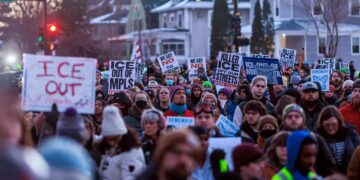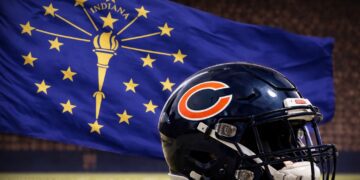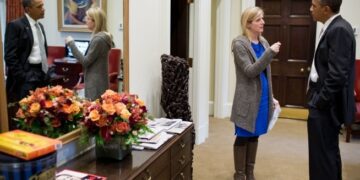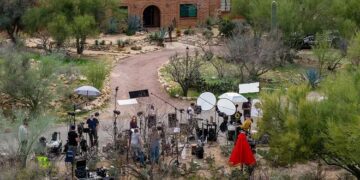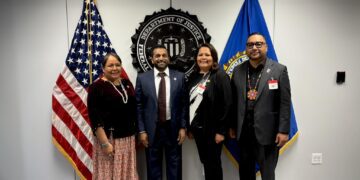For years, friends walked through the mall, chuckling as they passed that funny counterculture store, on their way to the department store that served as an anchor at that end of the mall. They only came for the big department store, for its holiday sales and gift cards, and the licensed sweatshirts and jackets that they wore everywhere.
They never noticed, but they often passed another group, going the other way. That group would enter at the department store entrance because they liked parking there, but they’d never shop in it; they liked the little boutiques down the aisles; that’s where they spent their time.
Across the mall, on the other end of the wheel, another couple of friends headed toward the sporting goods store, never noticing the couple passing them in the other direction, headed for the health food store or the “natural crafts” shop halfway down the aisle. For years, these stores had all been the source of smiles, or maybe sneers, from each other’s respective customer bases.
All of these stores – big and small alike – struggled for years, as online shopping gradually chewed away at their customer bases, as the loss of manufacturing lowered the income of the working class, as growing taxes sapped the nation’s disposable income.
Year after year, the city raised the property taxes on the mall, the state raised the energy rates, so the mall management company raised the rent on each storefront. The state raised the income tax on the stores, then raised the minimum wage they had to pay their part time clerks, then raised the state licensing fees, incorporation fees, bond requirements, and more.
The stores had to raise their prices and cut back on service – they had no choice – which made their online competitors even stronger in comparison.
Brick-and-mortar stores have been suffering for years, barely holding on through the growth of internet competition, spending more and more every year on security as the government released convicted criminals back on the streets, years before their sentences are up (if they’re sentenced at all).
Brick-and-mortar, long the first provider of work experience to high school and college students, has been faltering for a generation, battered by a few self-inflicted wounds and crippled by a thousand government-inflicted ones too.
One by one, chains contracted or evaporated throughout the Obama recession, waiting and praying for a real recovery, a real economic boom like the one they remember from the 1980s. And finally it happened.
Finally, in 2016, against all odds, Washington establishment insider Hillary Clinton lost to the businessman outsider, Donald Trump, and the recovery finally kicked into high gear. The country enjoyed three years of genuine economic growth – not that tepid one-and-two-percent stuff that the Obama apologists proclaimed “the new normal,” but genuine growth at – or over – three percent, possibly on target for a sustained boom of four. As unemployment went down and more potential customers had money again, more of the chains that had long been on the experts’ lists of “next one to close” finally started to recover.
But then came the Wuhan Flu.
Within a matter of weeks, the stock market tumbled by a third, thirty million Americans lost their jobs, and many states ordered retail stores to close for the duration – out of an abundance of caution – though with economic stats like these, the dwindling number of people who could still afford to shop would have been social-distancing anyway, by definition.
Every day, we read the financials and hear of fresh bankruptcy filings. Stores and restaurants that were already struggling have now been dealt the final death blow. Few businesses could afford to weather a three month closure, even in good times. The fear that they might reopen into a depression makes their prospects for reopening even bleaker.
We were in a boom time; a couple more years like 2018 and 2019 would have been enough to rebuild the foundations of many a chain, so they could withstand the next recession. But this one – largely manmade, in an overreaction to wildly pessimistic estimates – hit too soon.
And so we see these temporary store closures, in so many cases, become permanent.
We see retail chains that in January expected merely to shrink, announce in May that they will give up the ghost completely. The strip mall of ten storefronts dwindles to five, then to three. The huge indoor mall of fifty or a hundred is cut in half, then halved again. How will that mall keep its doors open now, we ask, with a quarter the rent to fund the massive footprint, the huge utilities and property taxes, the upkeep and security of a much larger mall than it has become?
And then we realize how much we depended on these retail establishments all along, whether on a regular downtown sidewalk or a strip mall or a big indoor mall. We didn’t just need them for shopping; we needed them to provide that convenient first job for our kids and our grandkids. We needed them to bring sales and property taxes into our communities.
The more retail we had, the lower our own property taxes could be; the more retail we lose, the more of the burden we have to share directly, in our own personal sales taxes, gas taxes, income taxes and property taxes. Watch your local, county and state governments; they will hike your taxes to make up for the commercial tax revenue loss… maybe this fall, maybe not until after the election.
And perhaps we will learn a lesson that we should have learned, years before.
They All Play A Role
If we derisively laughed at some store, or restaurant, or service, because it wasn’t our kind of thing… we now feel its loss, because that store or restaurant was making it possible for our favorite store or restaurant – in that same mall or outlot – to survive.
It’s true in any downtown, but all the more so in a mall: the costs of operating that mall, and the general costs of operating a town too, are spread out among all the many businesses in the community. Our son or daughter could get a part time job – on weekends, or weeknights, or over the summer – only because that store was there. And that store might only be able to afford to be there because of the other stores in the mall, all sharing in the cost of heat, air conditioning, and parking lots.
The anchor stores bring in the foot traffic that introduces new people every day to the small boutiques. There’s a symbiotic relationship between them all.
If we laughingly pull our business from the local retailers, and give all our money to Jeff Bezos and Jack Ma, then soon, there will be nobody to give our kids that first part time job. Soon, there will be no place to try on clothes before we buy them so we know they fit, no place to buy the things you need to look at in person, those decisions you just can’t entrust to a thumbnail picture on a website.
So many of us proudly say “I do all my banking online now; I don’t need that bank,” and “I do all my shopping online now; I don’t need that mall,” never realizing that they DID need that bank, that department store, those little boutique shops, after all.
The conservative who makes fun of the vegetarian restaurant, the liberal who makes fun of the gun shop, and the stuffy elitist who makes fun of the tee-shirt silkscreening store – they never realized how much their favorite stores depend on their least favorite stores too.
The mall needs all of its storefronts to succeed – the giant anchors at the end of the aisles, the expensive corner locations that everyone crosses at some point, the little mid-block storefronts that most of us pass by on our way to their neighbors. Even the little jewelry kiosks and toy kiosks and wristwatch repair booths in the middle of those aisles have a part to play. They all collaborate, even if they don’t know it themselves.
It is only by all these stores bringing in foot traffic for each other, making sales, and paying utilities and taxes, that the whole downtown, the whole shopping center can succeed.
We Are Not Alone.
One political party has been using a trite old line – “it takes a village” for some thirty years now. Lately, during the business closures of the 2020 pandemic, they’ve taken to a new version of the same thing – “we’re all in this together.”
It’s true, in a way, but not in the way they think.
In the American economy, we all do depend on each other, but not for charity, not for taxes and shaming and peer pressure. We depend on each other because the way our economy is designed, one person’s success supports everyone else’s success. To quote a much wiser Democrat than we’ve seen on the scene in many years, “a rising tide lifts all boats.”
John F. Kennedy was right. The retail world – the old-fashioned, brick-and-mortar stores that pepper our landscape – work together to keep the country moving. They employ the small businesses: a thousand small trucking companies, rather than a single giant one… they employ a thousand landlords, rather than a single industrial park REIT… they create a vibrant variety of starting jobs for every talent and every type of employee.
If you go to the pet store for pet food, brushes and clippers, cat houses and puppy beds, you’re served by cashiers who love animals as much as you do. If you buy watches at a jeweler, clothes from a haberdasher, dishes from a kitchen store, books from a bookstore, you’re helping those employees find their passion.
On the contrary, if you buy everything online, you’re helping Amazon to put those small businesses out of business. The people who process your order will never even see the product; they’re stuck on an assembly line in a giant distribution center, labeling cardboard boxes so fast they don’t even notice what they’re shipping.
I for one don’t believe that’s what our Founding Fathers had in mind when they designed our economy.
I believe they envisioned silversmiths like Gorham and Revere, printers like Franklin and Rivington, brewers like Sam Adams, cobblers like Enoch Crosby.
Our nation was designed for farmers and merchants, manufacturers and teachers, parsons and ranchers, small businessmen all, from coast to coast. Our Founding Fathers did not envision a nation in which everyone bought everything by mail order. They’d tried that already – working with the infamous factors of London in colonial times – and they most certainly did not approve.
In the weeks and months to come, as the nation reopens and we find ourselves able to shop freely at last, let’s return to the brick-and-mortar once again. Let’s give those proprietors a reason to hire our kids for the summer; let’s give our communities a robust economy again.
And let’s cheer when stores survive and prosper, not just the ones we’d shop at ourselves, but even the ones where we don’t remotely understand their appeal. Because in order for capitalism to work, we do all need to be productive – conservative or liberal, moderate or apathetic.
We need to reopen America. We need to work… and shop… and live again. As free Americans.
Copyright 2020 John F Di Leo
John F Di Leo is a Chicagoland-based trade compliance trainer, writer and actor. One of his favorite part-time jobs was as a part time clerk at Marshall Field’s, his freshman year in college, like his father and grandmother before him. A year or so working retail is good for everyone, and the prospect of that opportunity being denied to future generations is a sad one indeed.
Don’t miss an article! Use the free tool in the margin to sign up for Illinois Review’s free email notification service, so you always know when we publish new content!


